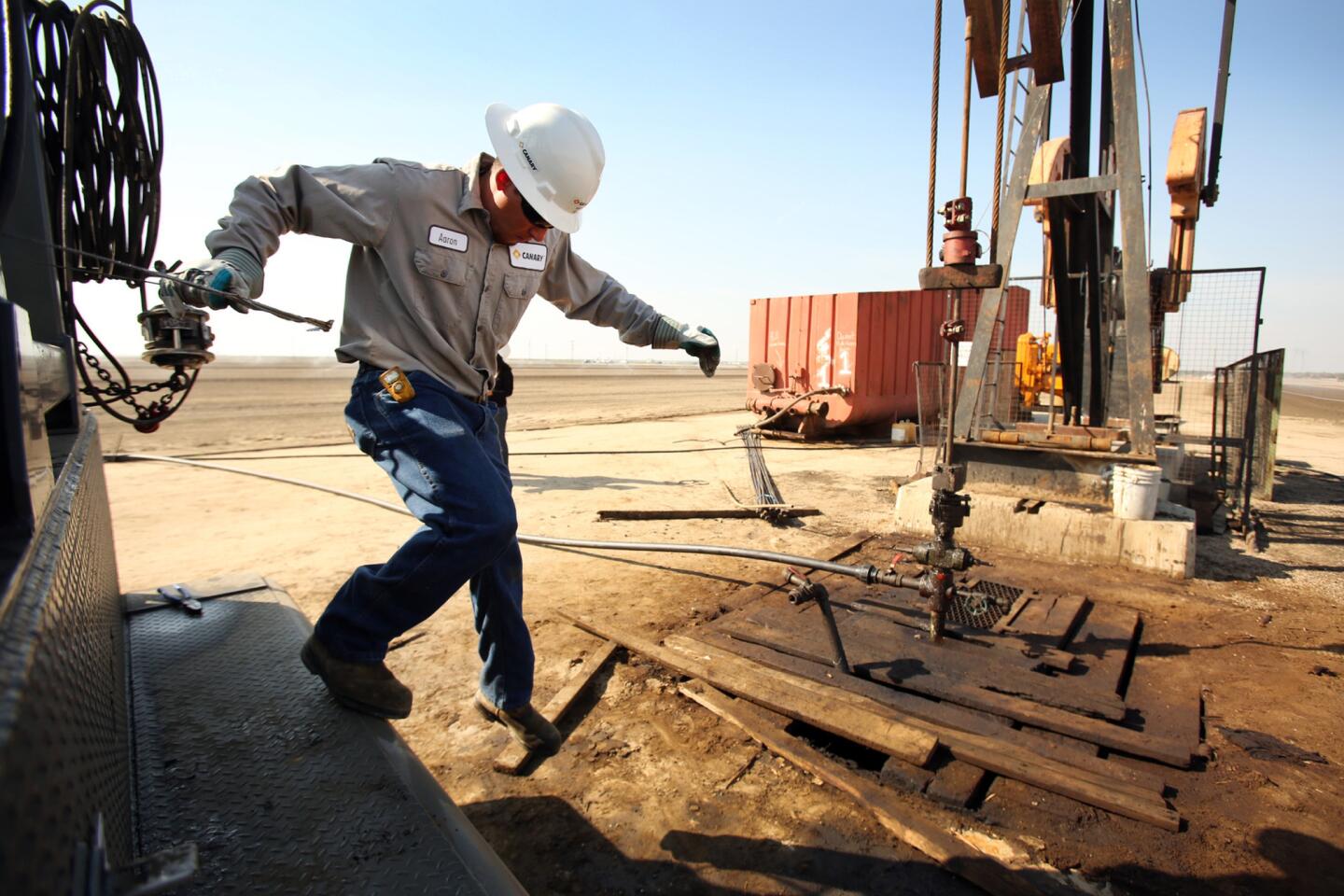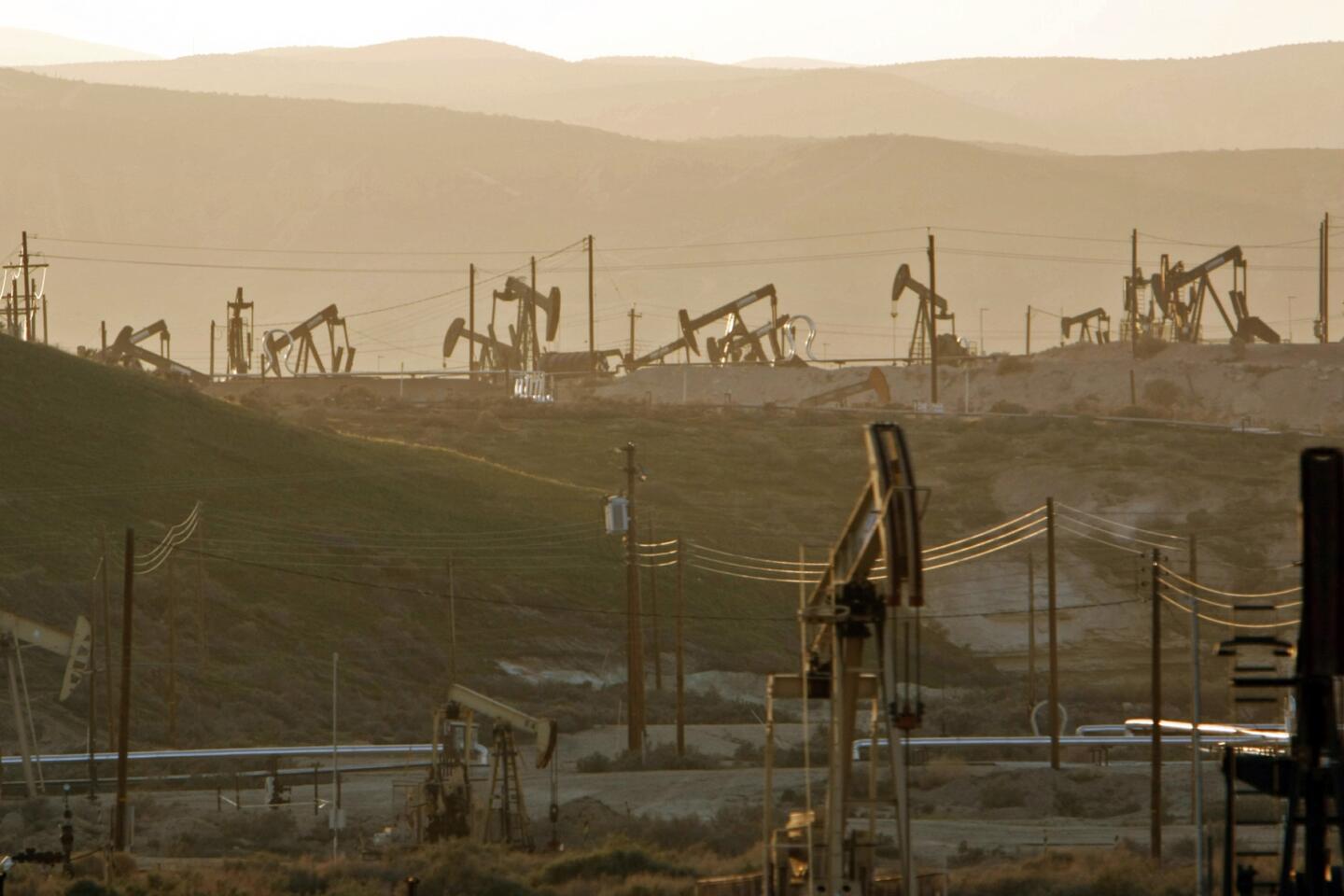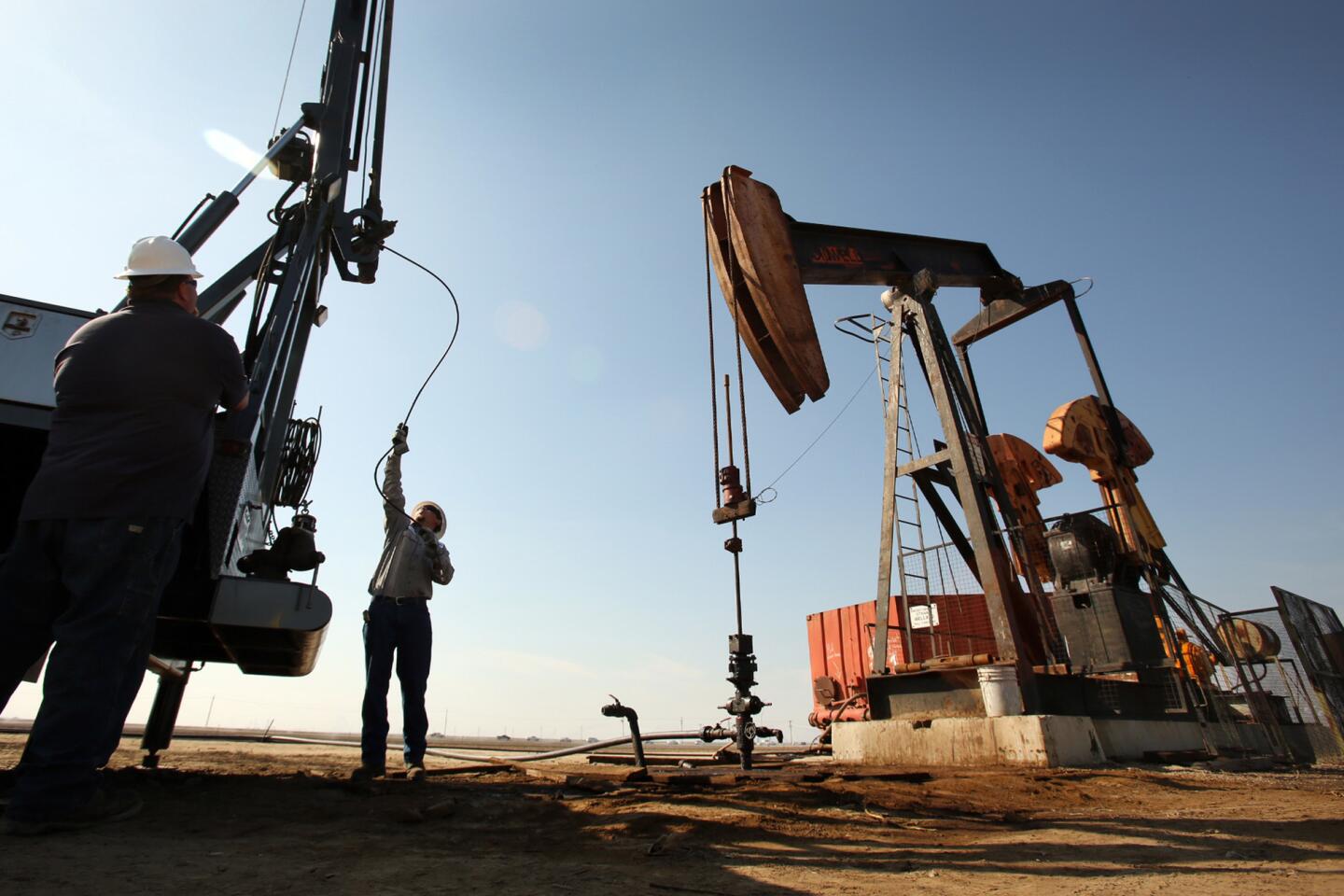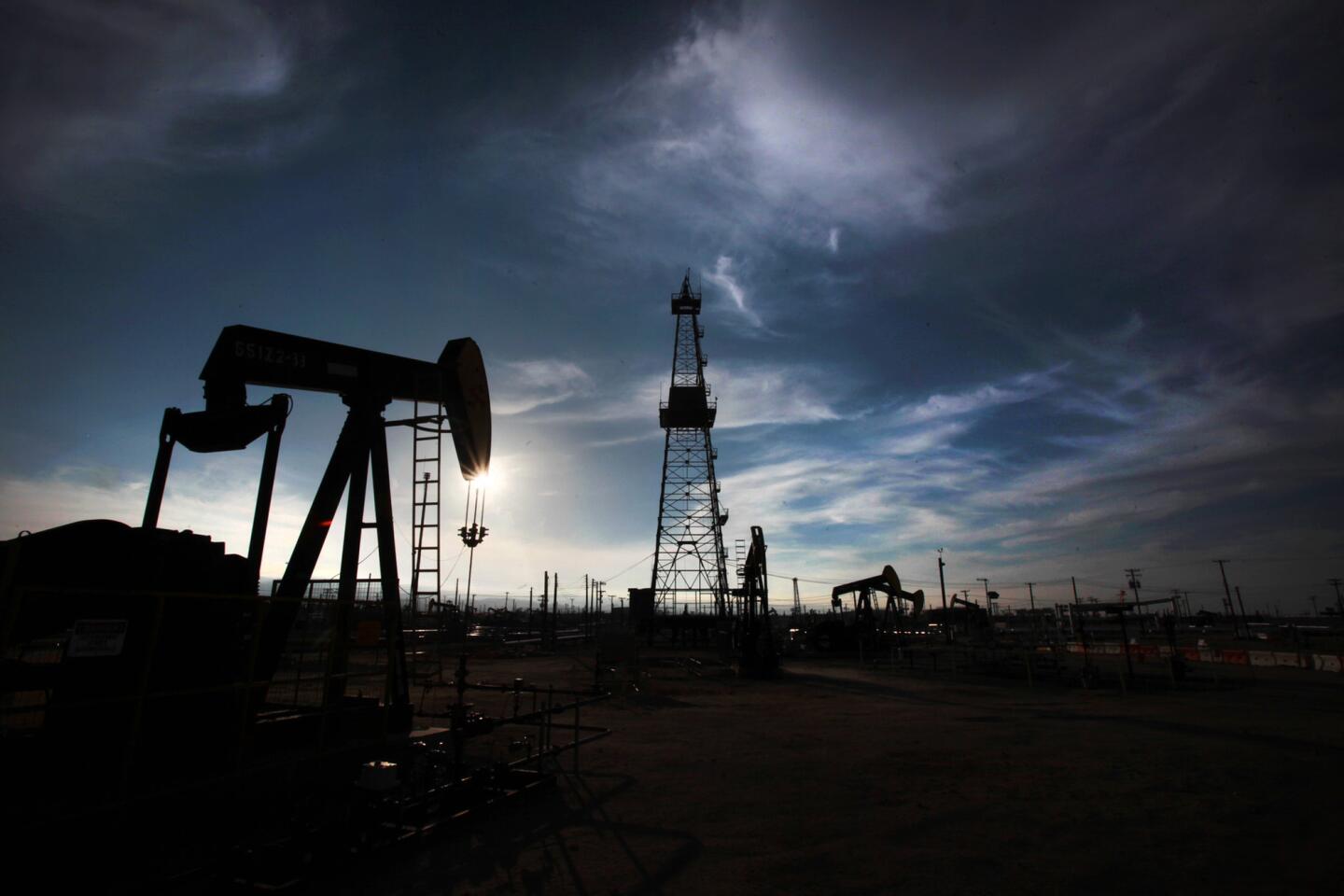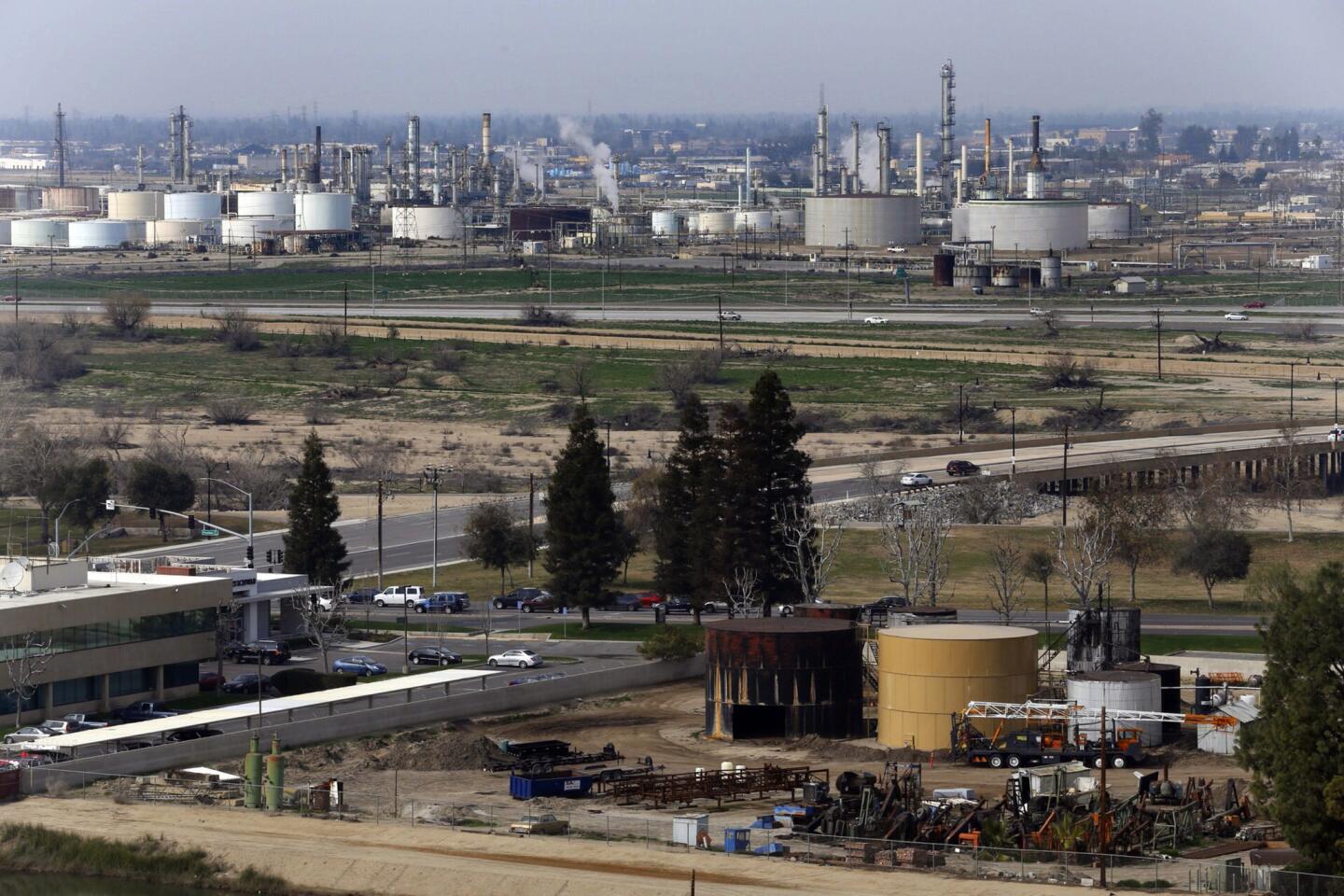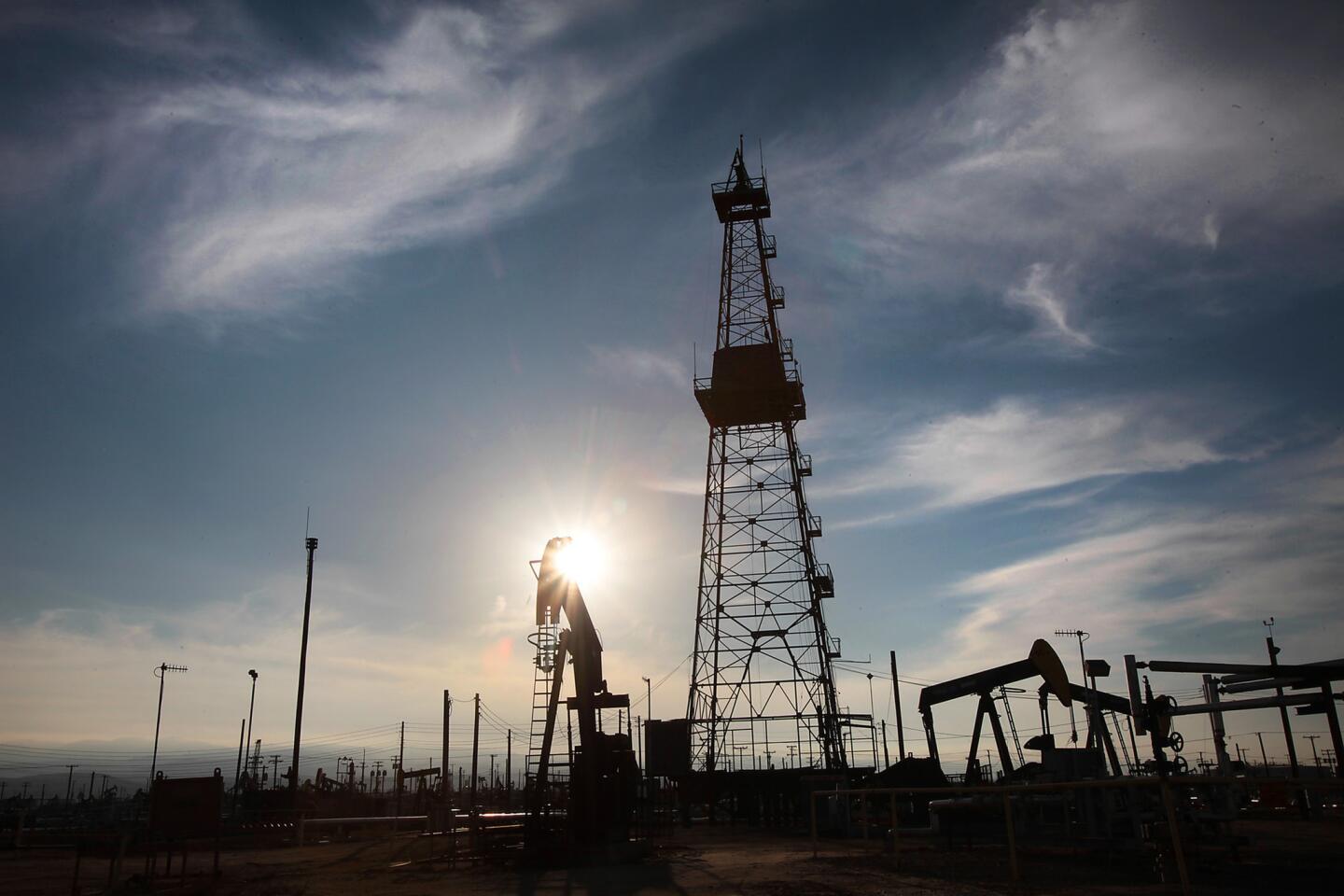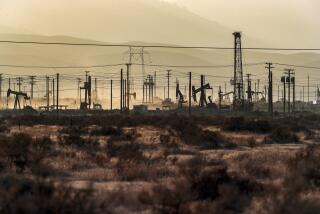Plunging oil prices choke off boom in Bakersfield
Each year, the American Assn. of Drilling Engineers hosts a meeting here affectionately called the Liar’s Club.
A cocktail-fueled crowd hears oil companies’ well-drilling and production forecasts — estimates often so grandiose everyone understands they are exaggerations. Pledges to drill thousands of wells are common.
But at this month’s meeting, no one felt like telling tall tales. Fewer than 10 wells were promised, all by small, independent companies. Giant firms — Chevron, Occidental — promised nothing, said Dave Rippy, general manager of Bakersfield Drilling Consultants, who has attended for two decades.
“I’ve never seen anything like it,” he said. “It was very somber, very eerie.”
Plunging oil prices worldwide are landing hard in Bakersfield, choking off the boom of recent years in one of America’s great oil towns.
Since June, oil companies have let go more than 21,000 people nationwide, according to career counseling firm Challenger, Gray & Christmas. In December, Canadian oil field services firm Ensign Energy Services notified California authorities that it planned to lay off as many as 700 workers in the state.
Drilling projects are being delayed or canceled. Only 14 drilling rigs are active on land in California, down from 48 in June, according to oil field services company Baker Hughes in Houston. So far this year, the state Department of Conservation has received 147 notices from oil and gas companies intending to engage in new drilling, down from 225 during the same period in 2014.
On Tuesday, supervisors in Kern County declared a fiscal emergency, citing lower property tax revenue from oil properties.
The government could face a $61-million hole in its budget when the fiscal year begins July 1, according to projections from the county’s assessor-recorder office. The decline in revenue for county services, fire protection and schoolsis expected to be “the largest we’ve seen in a long time,” assistant assessor Lee Smith said. “It’s going to impact all the departments.”
California is the nation’s third-largest oil producer behind Texas and North Dakota, according to the federal government. The majority of the supply comes from Kern County, home to the five most productive petroleum fields in the state.
More than 188,500 Californians work in the oil industry, according to a report last year from the Los Angeles County Economic Development Corp. That includes employees and sole proprietors in such areas as drilling, refining, pipeline construction and machinery manufacturing.
Some 12,000 people are on oil and gas extraction and well-drilling payrolls in Bakersfield. Combined with related positions in refineries, pipeline transportation and more, nearly 7% of all jobs in the region are linked to petroleum — the highest percentage among large U.S. metropolitan areas.
Oil is “the lifeblood” of the local economy, said Melissa Rossiter, spokeswoman for the area’s Chamber of Commerce.
“Either you work in oil or you know someone who does,” said Rossiter, whose father was in the industry for 35 years.
The forces descending on the industry here extend far beyond its borders and its control.
Amid a global glut, oil prices have been halved in less than six months. Light, sweet crude, the benchmark for North America, closed down nearly 4% at $44.45 a barrel on Wednesday, hitting its lowest point in nearly six years. Brent crude, the global benchmark, fell 2.3% to $48.47.
U.S. stocks of commercial crude oil soared last week to nearly 407 million barrels — a record high since the U.S. Energy Information Administration began keeping track in 1982.
Demand can’t keep up, even amid historically low gasoline prices.
The small- to mid-sized oil producers clustered around Bakersfield are worried, even though they’re accustomed to the peaks and valleys of a volatile commodity, said Les Clark, executive vice president of the Independent Oil Producers’ Agency in Bakersfield
“There’s a lot of serious faces around here,” Clark said. “We’re all hopeful the price is going to bounce back soon.”
Until it does, companies are scaling back.Westwood firm California Resources Corp. this month backed away from a project in Carson that would have created up to 200 wells. Economists had projected that the project would support 300 jobs.
The company, recently spun off from Occidental Petroleum Corp., said the project was “no longer practical in the current commodity price environment.”
Others in the industry, such as Dave Rippy, have turned to backup plans.
For a decade, Rippy and his wife supplied drilling consultants for rigs operated primarily in California. At one point he had 22 consultants in the field.
As of a month ago, he had none. Rippy and his wife are thinking about shutting down the company. He’s now focused on outside work as a sales manager for a pump-rental company.
“I could see it coming,” he said. “I kept telling everybody that the balloon’s going to pop.”
Before oil prices fell, Bakersfield had done well in the economic recovery. A boom in the oil fields helped pull the region out of the housing meltdown, when it suffered some of the highest foreclosure and unemployment rates in the nation.
The city’s population has been growing, in part because of an influx of educated young professionals, along with businesses attracted to the relatively low cost of operating in the area.
The prosperity could be seen in rising revenue last year at the Petroleum Club, a private dining club at the top of the city’s tallest building, where men wearing plaid shirts meet over white tablecloths under gleaming chandeliers.
The club makes the bulk of its money from a still-steady stream of parties and banquets, many booked years in advance.
But in the last three months, it has also lost members and started waiving initiation fees to lure new ones. Although the club serves agriculture executives, doctors, lawyers and more, most of its members still come from the oil industry.
“When oil prices go down, oil companies are a little more reluctant to pay a membership,” said Weldon Soris, the club’s membership director.
Kern County is seeing a more dramatic effect on tax collections.
The price per barrel — which on Jan. 1 was assessed at $55 compared with $99 a year earlier — is one of the primary factors used to calculate the taxable value of oil fields and other properties, according to the County Administrative Office.
Oil and gas companies accounted for roughly a third of the assessed value of the county’s tax base last year. Administrators expect tax revenue reductions of at least $44 million for the county’s general fund and $17 million for the fire fund.
Property values, which in oil towns tend to follow crude prices, could also waver.
Local companies such as DrillCool are weighing their options. The Bakersfield firm rents out specialized machinery designed for use during high-temperature drilling. Until recently, the company had a waiting list to manage high demand; now, several coolers sit unused in the yard behind its warehouse.
More than half of the company’s business has been in North America, but it plans to increasingly scour the globe for customers.
“You go where the going is good,” said global sales manager Fred Nilson, whose office has a floor-to-ceiling map showing DrillCool equipment deployed around the world.
Bakersfield “is an oil and agriculture town. We’ve been through these cycles before,” Nilson said. “But there’s concern — people don’t want to say fear.”
Twitter: @tiffhsulatimes
